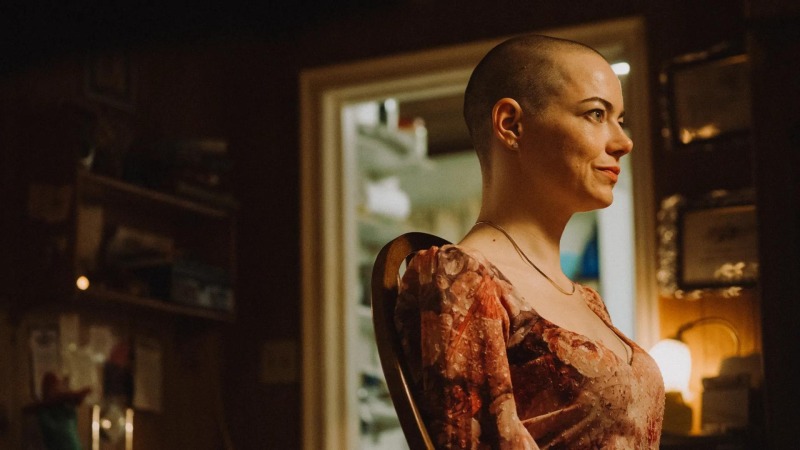Yorgos Lanthimos’ Bugonia Makes Absurd Mockery of the American Psyche

An English-language remake of a South Korean film is almost never a good idea. For those still recovering from Spike Lee’s misguided 2013 reimagining of Park Chan-wook’s Oldboy, rest assured that Yorgos Lanthimos’ Bugonia does not make the same mistakes. Instead, Lanthimos offers us an absurd anti-capitalist fable that takes the best elements of Jang Joon-hwan’s 2003 film Save the Green Planet! and transforms it into a wackier, more enjoyable mockery of the modern American psyche.
The film opens with our antihero Teddy (Jesse Plemons) explaining the process of pollination to his cousin Don (Aidan Delbis). “It’s like sex,” he asserts, “but cleaner, because nobody gets hurt.” Teddy is a beekeeper whose many hours spent down internet rabbit holes has convinced him that the destruction of the planet, and consequently the crisis of colony collapse disorder affecting his bees, is all at the hands of pharmaceutical conglomerates like the one owned by CEO Michelle Fuller (Emma Stone), for whom Teddy works. As he discusses the myriad ways in which worker bees are exploited like humans, we’re given a montage showcasing Fuller’s frankly psychotic morning routine. Every day she wakes up at 4:30 am and trains like an athlete in her secluded mansion; she does yoga on the balcony, martial arts training in the garden, VO2 max tests on a treadmill. It feels like a visual representation of the kind of doomsday-prepping we hear tech billionaires are doing (it doesn’t feel like a stretch of the imagination to picture an oddity like Mark Zuckerberg in his California compound following this exact same routine).
Teddy’s answer to a rapidly deteriorating planet is simple: Kidnap Fuller and torture her for the suffering her company has brought upon the world. Admittedly, it’s an insane (but, dare I say, tempting?) solution to the problems of our time. This clash of the rich vs. the poor composes much of the film’s runtime, and as a commentary on the destruction of the planet at the hands of the uber wealthy, Bugonia favors absurd comedy over biting satire. Case in point: After conducting the abduction with all the grace of two bulls somersaulting through a china shop, Teddy and Don shave Fuller’s head to prevent her from communicating with her alien overlords. Then, they lather her in antihistamine cream to block any signals being emitted from her pores. According to Teddy, Fuller is a soldier of the extraterrestrial Andromedan species sent to destroy the Earth, and he must do everything in his power to put a stop to it.
At any other point in time, Teddy’s character might have seemed more like a whackjob and this film might have seemed more ridiculous. But after the ushering in of a President who favors conspiracy over scientific fact and the rise of questionable internet subcultures, Bugonia feels less bizarre and more like a warning.
Simultaneously, despite trailers marketing the film as a raucous, bloody affair, Bugonia might actually be Lanthimos’ most digestible film to date. Teddy speaks of YouTube “researchers” who inspired his own research into colony collapse disorder and bristles at Fuller’s no-nonsense corporate speak — “I’ve read all the think pieces,” he assures her. Fuller, in turn, attempts to negotiate her release by reciting the kind of well-rehearsed, empty phrases characteristic of heartless bosses; she asks Teddy for a “dialogue” and claims that she “would love to keep the conversation going.” She bears all the hallmarks of an archetypical girlboss, with her power suit and a framed picture of her shaking hands with Michelle Obama. Above all, she’s a female capitalist who’s unafraid of leveraging her social identifiers as a means of elevating herself above her peers. When she monotonously recites lines about the ethos of her company, you get the feeling that you might actually be listening to an android speak. It’s all very familiar for anyone who has spent any amount of time in a corporate setting.
-

-

-

-

-

-

-

-

-

-

-

-

-

-

-

-

-

-

-

-

-

-

-

-

-

-

-

-

-

-

-

-

-

-

-

-

-

-

-

-








































